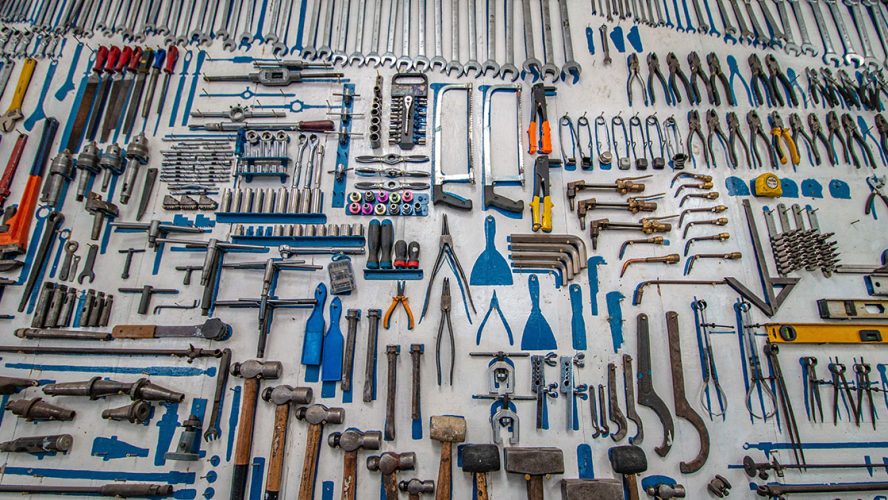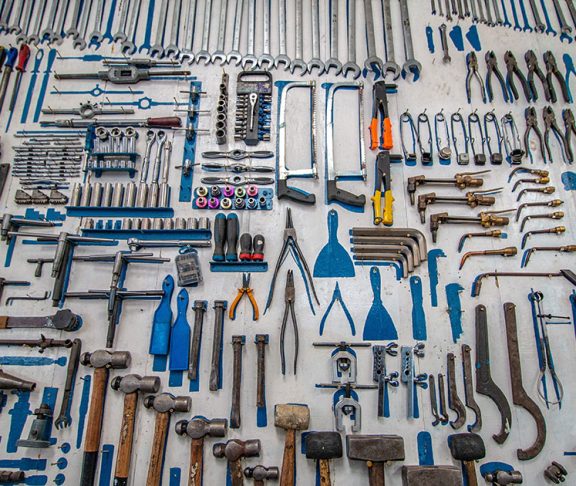We asked our team of small business experts about how tools like social media, ecommerce, buy-now-pay-later solutions, and more helped entrepreneurs stay afloat throughout the pandemic, and how to leverage these technologies in the future.

Gary Vaynerchuk
CEO, VaynerMedia, Chairman, VaynerX
What is the top challenge facing small business owners today?
It’s a tricky question because you have the people that were affected by COVID, much more than others in the small business world, so to break it up into a subset, one group is just looking to survive, because the rules of COVID are unfortunately not in their favor. And then the other group is in the macro, more general; it’s how to make marketing money drive their business.
I think the No. 1 thing a lot of small businesses are struggling with is not knowing how to actually grow their business. Hearing things like “social media works,” but then not knowing exactly how to make it work. So I think there’s a huge divide right now in the small business space between the group that knows how to use creatives and content, and then the entire other group that does not.
For small businesses, social media marketing is so important because you don’t need millions of dollars or hundreds of thousands of dollars to be in the game. The problem is almost everybody attacks social media organically, and they think you just post some stuff on your account and go to sleep. And the reality is for a small business selling a pizza pie, getting somebody to sign up for your dog walking service, getting a new client for your hair salon, it really does require knowing how to spend the media on these platforms.
And I’ve come to kind of have this wake-up moment that that combo is not being had, and that’s the biggest myth. Do you know how to make pictures, videos, and written words, and then run media on these platforms? When I say run media back to small business talk, it can be as little as a $500 media spend against that. But then that actually drives your business. And that’s why you have; this group of people that are obsessed with social media. And then another group that’s like, “It doesn’t work.” We don’t break out the combo of media spending within it, versus not spending media within it.
What would your advice be to small businesses looking to work on their brand purpose?
I think they have to focus on truth. Don’t focus on where you think the world’s going, whether it’s the environment or this or that, or the other thing. What do you do that runs a small business? What do you care about? And then that truth becomes the brand purpose.
What are some of the technologies you feel can help elevate small businesses?
If it’s a B2B small business, it’s LinkedIn — pictures and videos, but then spend media behind it. If it’s a consumer product, YouTube, Tik Tok, Twitter, Facebook are where to go. You can’t think that social networks are changing the world through democracy and politics, and not also then recognize that they are the massive driver of business today. And we continue to have a large percentage of the world underestimate social media as a nice little thing, versus the fundamental force of communication, which leads to business.
Do the same types of messages work across all of these platforms? How do you know if something will work on TikTok and not on LinkedIn?
Like anything in life, you have to be good at it. You could tell me right now that cooking meals is the most important thing in the world for your business. And then I would have to start the process of learning how to cook. And that’s my analogy for social.
Somebody looking at your picture or video on Pinterest is a very different person that someone looking at it on LinkedIn. Their mindsets are different when they’re on a different platform. It’s no different than when you’re at the office, versus being at home, or on the golf course, or on a vacation with your best friends. There’s different context.
And I would argue as much as I’ve talked about content, the context of where you’re making these pieces of content is almost the most important variable of success.
What qualities do you think successful entrepreneurs have in common?
They lack the fear of judgment of others, and the successful ones are wildly patient in the macro but extremely efficient in the day-to-day micro. They think about things in a 10-year window to be successful, not a 10-day window, but on a daily basis, they’re making every hour matter.
What questions will every investor ask an entrepreneur before investing in them and their small business?
There’s two really, which is like projected finances, which I think is a complete waste of time because everyone’s guessing. I think the smart investors will ask, and what really has worked for me, is a question about who that entrepreneur actually is and why they are actually building this business. I have found looking back at my successful investments versus my not-successful investments, that question, answered more properly, has led to a lot more success.
Why is it important for small businesses to create an effective digital experience for their customers?
Because digital is actually the primary world society now lives in, not analog. Even some young entrepreneurs and business people have had success analog-wise, and then, because of that, don’t value or recognize that they’re vulnerable by not having digital.
I know of an incredible 30-year-old entrepreneur who’s got a physical barbershop business with no social presence. He would think that’s wild but he was actually a second-generation barber, and just understood the business and built a great barber shop business with multiple locations.
But what he didn’t realize that ended up happening with COVID was that by not having the virtual presence, once analog kind of got hurt, which is an extreme case with COVID, it rendered him useless. And he couldn’t really reach out and have relationships with his customers. What digital does is it lets you be omnipresent and have that relationship point, and everybody needs to build that.
What role do you think social media plays for small businesses?
Social media is the most democratic place to get business. And small business, for me, that’s the most exciting place, because they get outspent in print, or radio, or television, but in social, even though they will be outspent, it still has the biggest upside for democracy. I believe social media is oxygen for any small business.
In your opinion, why are small businesses the backbone of the American economy?
I just think it’s data, the amount of jobs created. A stunning amount of our Fortune 500 big businesses started as small businesses. So for me, it’s not only the sheer amount of job and local economic impact it has mathematically; I tend to remind people that almost every big company in this country started small.
How did VaynerMedia get started?
I had amassed a lot of followers on Twitter and YouTube doing my wine thing for my dad’s business, and ESPN and Pepsi cold emailed my wine’s email address, asking for me to consult. When I found out how much they were paying me for an hour of consulting of what to do on this new thing called Twitter, I called my brother, who was in his last semester of college, and I said, “I have an idea. I think we should help big companies and social media.” That is literally how it was born.
It’s a good macro lesson. When the market is telling you something, react to it, don’t dismiss it as random.
What inspires you in business?
I think it’s like art, you get to create. I literally thought of this in my mind and now I have a business of 1,000 people. There have been 15 marriages. You’re an artist, you’re creating things from your mind that become real things in the world, and for me that’s invigorating and has been from the age of 6.
In the age of COVID, is this a moment for people to have a fresh start or pursue something that maybe they hadn’t really thought they could do?
I said something the other day that rocked a friend of mine. He just emailed me about it this morning and it completely shifted what he was going to do. I said, “there’s never a bad time to start a good business.”
I really think that will historically hook right in. I promise you in 12 years, 15 years, there will be an incredible number of documentaries and profiles on businesses that started doing COVID.
Can explain the importance of EQ versus IQ?
First of all, small businesses are very good at long term. So, in general, that’s their strength. I think that corporate America struggles with that. I think the IQ-EQ thing is huge. When I look at small businesses — and I grew up in one with my dad’s liquor store — I believe a lot of small businesses think their employees work for them and service them, and it leads to lack of retention and bad atmospheres, and there’s a lot of small businesses that I think misplay the way they treat their employees or what they look for in employees.
I look for A+ humans that are sunshine and rainbows and I can teach them the skills, even if they’re a C+ in skills. I’ll take that person, and most small businesses struggle with that and treat their employees the wrong way, which is why they have a lot of turnover and overvalue employees that create short-term business results, instead of long-term culture results.

René Lacerte
CEO and Founder, Bill.com
Why is it important for us to support local small businesses, especially during these unprecedented times?
COVID-19 showed us that small businesses are the lifeblood of our economy and the glue of our communities. Small businesses will lead us out of the pandemic and into a full recovery. According to a pre-pandemic study, small businesses make up close to half of the U.S. GDP.
We focus on powering small businesses by taming the financial mess and helping them pay and get paid with ease so that they can focus on what matters most: growing and doing business.
More than ever, small businesses are a driving force in hiring employees and driving innovation. Supporting small businesses can play an essential role in getting the economy on track.
What is the biggest challenge facing small business owners today and what advice would you provide to entrepreneurs looking to overcome this?
Starting and growing a business is incredibly challenging on its own, and the ability to adapt to change means there can be make-or-break decisions every day. Even as entrepreneurs try to stay focused on the top line, we consistently see and hear that the back-office burdens steal their precious time and limit their ability to scale.
The pandemic brought these challenges to the forefront. For instance, our recent survey found that close to 80 percent of small business owners began to or plan to begin digital transformation during the pandemic.
Looking ahead, leveraging reliable technology and building the right infrastructure can help small businesses automate, streamline operations, and accelerate growth opportunities.
Which technologies have you seen make the biggest impact on small business recovery efforts during the pandemic?
Whether a small business operates in-person, partially remote, or fully remote, technology should make their lives easier. It should work for business and not against it.
Early on in the pandemic, many small businesses realized their processes for accounts payables was unmanageable. You could no longer walk around the office to get approvals. Signing checks and reviewing invoices in person was just not a viable option.
Automating payments and adding more visibility to real-time cash flow changes has enabled small businesses to make better, faster decisions. Ultimately, it helped them save time, increase efficiency, and focus their attention on strategic shifts or new customer needs. During the pandemic, these were not superficial benefits, but actual lifelines for many entrepreneurs.
The truth is every minute matters in an entrepreneur’s day and automation increases the impact they have.

Lillian Roberts
Founder & CEO, Xendoo
Why is it important for us to support local small businesses, especially during these unprecedented times?
It is important to support our local small businesses because small business is the backbone of America. All businesses start out small. Even Starbucks started as a single location. Collectively, small businesses are this country’s largest employer. They give our children their first jobs and support local communities through sponsorships, taxes, and opportunity. Logistically, small business owners employ people in their own communities, procure items and food from local sources, and do it all while running businesses and raising their families. Small businesses often support an entire financial ecosystem.
What is the biggest challenge facing small business owners today and what advice would you provide to entrepreneurs looking to overcome this?
Speed of change in business — you have to be ready to run like hell. Speed of change requires small business owners to be agile, be humble, be daring, recognize opportunity, build relationships, and never stop learning. The pandemic was a great lesson of agility for small businesses;learning to let go of what was and being able to turn on a dime in an ever-changing world. Entrepreneurs showed their resiliency and pivoted to do business in the way they needed to, and found their way through the change regardless of their prior plans or vision.
Which technologies have you seen make the biggest impact on small business recovery efforts during the pandemic?
For restaurants, it was the online payment and menu platforms that provided the ability to deliver their food in a closed world. For businesses that had to shutter their doors and switch to a remote work model, Zoom and similar technologies became essential to sustainability. Online bookkeeping and accounting platforms became imperative to keeping businesses compliant for PPP loans. Payment platforms became even more essential for all sizes and industries of business. Ecommerce platforms allowed the unemployed to start businesses, become business owners, and provide what the world needed when retail shops shut down. The pandemic accelerated ecommerce procurement of all products.

Toby Scammell
CEO and Founder, Womply
Why is it important for us to support local small businesses, especially during these unprecedented times?
Small businesses have a big impact on our economy and local communities. They’re critical to job creation, upward social mobility, and they represent the best of America’s values such as freedom, independence, and optimism. But these dynamic businesses are often thinly capitalized, so economic shocks like the pandemic can lead to widespread business failures without government support.
What is the biggest challenge facing small business owners today and what advice would you provide to entrepreneurs looking to overcome this?
Adapting to changing technology is a central challenge that every small business must confront. More than ever, customers expect businesses — regardless of size — to use technologies to make discovery, buying, and getting support easier. Employees and managers can also benefit from technologies. But selecting and integrating these tools into an existing business is particularly challenging.
Which technologies have you seen make the biggest impact on small business recovery efforts during the ongoing pandemic?
The pandemic accelerated two buying trends: First, customers are moving further away from the cash register when making payments. Second, the amount of time between when a product or service is delivered and when a customer actually pays for it is increasing. Software and hardware solutions are making these shifts possible. Now customers can order ahead for pickup, pay by phone instead of waiting in line, or pay later with a buy now pay later solution. All of these changes present opportunities for businesses, and those that adapt the fastest will be most likely to thrive.

